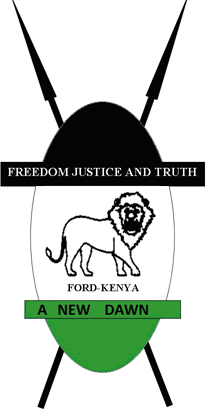
Uhuru Muigai Kenyatta is a Kenyan politician who served as the fourth president of Kenya from 2013 to 2022. The son of Jomo Kenyatta, Kenya's first president, he previously served as Deputy Prime Minister from 2008 to 2013.

Forum for the Restoration of Democracy–Kenya (FORD–Kenya) is a Kenyan political party. The party has sat in the government of Kenya once, under the National Rainbow Coalition, from 2003 to 2007, having ended forty years of one party rule. In April 2022, the party joined the Kenya Kwanza coalition for the August 2022 elections, and is headed by Moses Wetangula, the current speaker of the National Assembly of Kenya. The party tends to be more popular among the Luhya people.

Raila Amolo Odinga is a Kenyan politician who served as the Prime Minister of Kenya from 2008 to 2013. He was the Member of Parliament (MP) for Langata Constituency from 1992 to 2013 and has been the Leader of Opposition in Kenya since 2013. He is the leader of Azimio la Umoja–One Kenya Coalition Party.

The Wiper Democratic Movement–Kenya (WDM-K), formerly Orange Democratic Movement–Kenya (ODM–Kenya), is a political party in Kenya, which originated as a result of the 2005 Kenyan constitutional referendum. The party tends to be more popular among the Kamba people. It is headed by Kalonzo Musyoka, who ran for president in 2007 and served as the vice-president in the Grand Coalition of Mwai Kibaki and Raila Odinga. He is now a member of the main opposition Azimio La Umoja One Kenya Party.

General elections were held in Kenya on 4 March 2013. Voters elected the President, members of the National Assembly and newly formed Senate. They were the first elections held under the new constitution, which was approved in a 2010 referendum, and were also the first run by the new Independent Electoral and Boundaries Commission (IEBC). They coincided with the 2013 Kenyan local elections.

The Independent Electoral and Boundaries Commission (IEBC) is an independent regulatory agency that was founded in the year 2011 through the making of the Constitution of Kenya. The Commission is responsible for conducting or supervising referendums and elections to any elective body or office established by the Constitution, and any other elections as prescribed by an Act of Parliament. It was created in a provision of the 2010 constitution and the Independent Electoral and Boundaries Commission Act. Its mandate includes "the continuous registration of voters and revision of the voter's roll, the delimitation of constituencies and wards, the regulation of political parties process, the settlement of electoral disputes, the registration of candidates for elections, voter education, the facilitation of the observation, monitoring and evaluation of elections, the regulation of money spent by a candidate or party in respect of any election, the development of a code of conduct for candidates and parties, [and] the monitoring of compliance with legislation on nomination of candidates by parties."

The Supreme Court of Kenya is the highest court in Kenya. It is established under Article 163 of the Kenyan Constitution. As the highest court in the nation, its decisions are binding and set precedent on all other courts in the country.
Smokin Wanjala is a Kenyan lawyer and a justice of the Supreme Court of Kenya. He holds a Ph.D. in law from the University of Ghent, Belgium. He also holds a Master of Laws degree from the Columbia University in the United States and a Bachelor of Laws (LLB) degree from the University of Nairobi. Wanjala lectured at the University of Nairobi for 15 years, teaching international law, international human rights law, land law and criminal law.

Miguna Miguna is an Advocate of the High Court of Kenya. He practices law as an attorney, a barrister and solicitor in Toronto, Canada. Miguna served as a senior adviser to former Kenyan Prime Minister Raila Amollo Odinga from 2009 to 2011.
The Kenya Presidential Election Petition of 2013 was an election petition aiming to declare the Kenya presidential election 2013 invalid. The Petition was filed at the Supreme Court of Kenya on 16 March 2013.

General elections were held in Kenya on 8 August 2017 to elect the President, members of the National Assembly and Senate. They coincided with the 2017 Kenyan local elections which elected Governors and representatives in the devolved governments.

The Jubilee Party of Kenya is a major political party in Kenya. It was the country's ruling party from 2016 to 13 September 2022. The party was founded on 8 September 2016, following the merger of 11 smaller parties. During the 2017 election, the Jubilee Party secured a plurality of seats in Parliament and the party leader, Uhuru Kenyatta, was re-elected president.

Presidential elections were held in Kenya on 26 October 2017 following the Supreme Court's annulment of the results of the presidential vote in the August 2017 general elections. Incumbent president and Jubilee Party candidate Uhuru Kenyatta won 98.3% of the vote, defeating Orange Democratic Movement candidate Raila Odinga, who had withdrawn weeks before the election, believing that the Independent Electoral and Boundaries Commission had no intention of implementing reforms that would ensure a credible process.
Roselyn Kwamboka Akombe is a Kenyan former commissioner of the Independent Electoral and Boundaries Commission (IEBC) of Kenya.
Esther Nyaiyaki, is a Kenyan lawyer who works as a Registrar in the Kenya Judiciary. She served as the Registrar of the Supreme Court of Kenya from February 2013 to December 2021 and was involved in handling the petition that led to the annulment of the election of Uhuru Kenyatta as president of Kenya, in August 2017. She serves as a Registrar in the Office of the Chief Registrar of the Judiciary from January 2022.

The 2018 Kenya handshake was a political truce made on the 9th of March 2018 between Kenyan President Uhuru Kenyatta and former Kenyan Prime Minister Raila Odinga. The two had been the leaders of opposing political factions amidst widespread political violence and civil unrest; they had previously faced one another in the contested 2017 Kenyan general election. Under the agreement, their political feud was resolved, with Kenyatta agreeing to support Odinga in the upcoming presidential elections. As a result, the Azimio coalition was formed, Uhuru became its chairman, and Odinga as the presidential candidate with Martha Karua as his running mate. They lost to William Ruto, who was Kenyatta's deputy at the time. They challenged Ruto's victory in the Supreme Court, however, Chief Justice Martha Koome said his claims did not meet the evidentiary threshold and dismissed the case. At a March 2023 protest in Nairobi they demanded an audit of the IEBC election servers.

General elections were held in Kenya on Tuesday, 9 August 2022. Voters elected the president, governors, senators, members of the National Assembly, and members of county assemblies.

The Building Bridges Initiative (BBI) was a proposed set of amendments to the Constitution of Kenya initially proposed in October 2019. In the wake of the 2017 general election annulment and subsequent re-run, incumbent President Uhuru Kenyatta mandated the formation of the Presidential Taskforce on Building Bridges to Unity Advisory on 31 May 2018. The Taskforce was assigned to provide constitutional and legislative solutions in 9 broad categories:
- Lack of National Ethos
- Ethnic Antagonism and Competition
- Responsibilities and Rights
- Shared Prosperity
- Divisive Elections
- Safety and Security
- Devolution
- Corruption
- Inclusivity
David Ndii & Others V. Attorney General & Others also known as the BBI Judgement, was a landmark ruling made in the Kenya High Court on 13 May 2021, which issued an injunction on Kenya's Independent Electoral and Boundaries Commission (IEBC) from proceeding with President Uhuru Kenyatta's and retired Prime Minister Raila Odinga's Building Bridges Initiative. The five-judge bench was to determine seventeen questions raised on the petition against the BBI Process.

Wafula Wanyonyi Chebukati is a Kenyan lawyer and a former chairman of the Independent Electoral and Boundaries Commission (IEBC), which is responsible for overseeing elections in Kenya. Wafula Chebukati was appointed to the position on a six-year tenure in January 2017 by the retired President of Kenya Uhuru Kenyatta. Following his appointment in 2017, He succeeded Ahmed Issack Hassan. He retired on 17 January 2023 following the end of his term.













